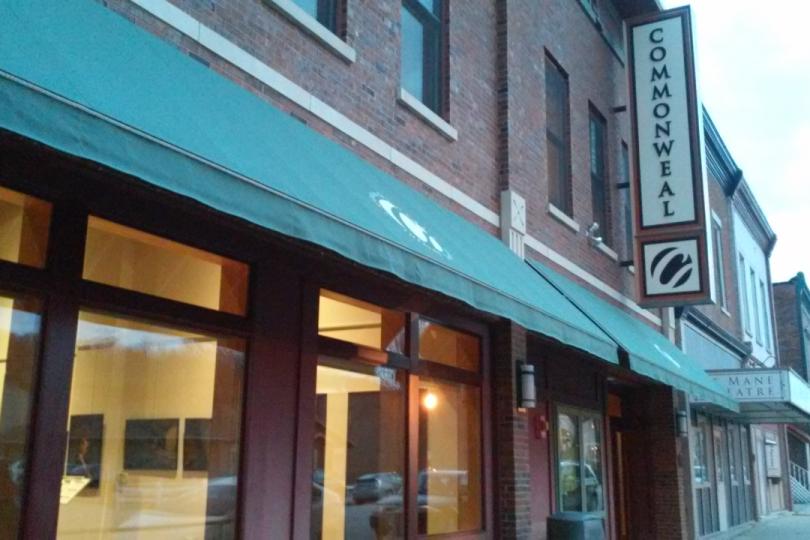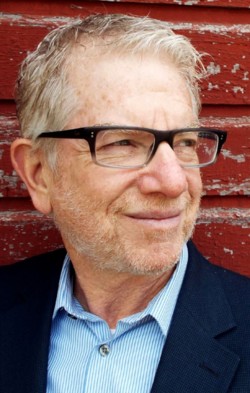The Commitment of Commonweal

If things had turned out as he envisioned when he was a boy, Hal Cropp would be a marine biologist today. For the sake of the arts, more specifically the theater arts, in the state of Minnesota, it is quite fortunate his path led him north.
Not Quite Marine Biology
Cropp, now the Executive Director at Commonweal Theatre in Lanesboro, grew up with a love of the water, a fascination with sharks and a desire to learn all he could about marine life. Although still a lover of the water, Cropp would grow out of that phase of his life to go on and obtain three educational degrees. “I went to Brown University as an undergrad,” says Cropp, “where at the end of your first year they have you map out to the rest of your college career.”
Having chosen biology as a major while also exploring the theatre scene at Brown, Cropp weighed which track he would rather take. One track would have had him in a lab five afternoons a week and the other, rehearsing in the theatre for five afternoons the remainder of his undergraduate career. “It seemed like a no-brainer,” states Cropp. He went on to major in theatre at Brown, earn a degree in that field and see the department granted its own status apart from simply being a division of the English Department.
Upon obtaining his degree and leaving Rhode Island, Cropp made his way to California where he explored his performance options as an actor while also solidifying a steady job to support that exploration. That job turned out to be health care and hospital administration, more specifically children’s hospital administration at Stanford University. “While at Stanford, I was encouraged by my mother to get a Masters Degree of Business Administration,” says Cropp. “It was a very exciting time as the dot com boom was hitting.” Cropp attended classes on all levels with individuals from engineering backgrounds with firms such as Apple, Hewlett-Packard, Intel, etc. “I was able to keep my head above water in the quantitative classes,” Cropp says, “but in the qualitative classes I was yards ahead of everybody else because they had no comfort level studying human interpersonal relationships.”
 Cropp managed that part of his education quite well, completed the program and earned his first secondary education degree, an MBA. Upon completion of that degree and having maintained his position with the children’s hospital it was suggested by his boss, who knew that Cropp did not want to be in hospital administration for a lifetime, that he truly explore a life in the theatre. Over the next several years, Cropp did just that. There were part-time jobs, auditions, and a role here and there and, overall, a satisfying journey. He would land in relatively permanent positions as Development Director for Valley Shakespeare Festival followed by the same position with a theatre for young audiences, delve back into freelancing as an actor and then return as Managing Director for Valley Shakespeare. That position would keep him occupied for the next two years.
Cropp managed that part of his education quite well, completed the program and earned his first secondary education degree, an MBA. Upon completion of that degree and having maintained his position with the children’s hospital it was suggested by his boss, who knew that Cropp did not want to be in hospital administration for a lifetime, that he truly explore a life in the theatre. Over the next several years, Cropp did just that. There were part-time jobs, auditions, and a role here and there and, overall, a satisfying journey. He would land in relatively permanent positions as Development Director for Valley Shakespeare Festival followed by the same position with a theatre for young audiences, delve back into freelancing as an actor and then return as Managing Director for Valley Shakespeare. That position would keep him occupied for the next two years.
Ultimately, Cropp knew that what he wanted and needed to do was to strengthen his acting chops. With that, he decided to return for a third degree, the Masters of Fine Arts. “I auditioned for and was accepted,” Cropp says, “to both MFA programs at American Conservatory Theatre in San Francisco and The National Theatre Conservatory in Denver.” Cropp opted to attend the program in Denver, obtained an MFA from that institution and, he concludes, “That culminated my formalized educational experiences.”
While in Denver, Cropp made the acquaintance of Lanesboro, MN native Eric Bunge. Bunge had worked with Cropp’s wife at the time, Kristen Underwood, in a production of Harvey at The Arvada Center for the Arts. Cropp would then go on to understudy for Bunge also at the Arvada Center and in the course of those rehearsals, Bunge would approach Cropp about a “little summer theatre” in Minnesota. Cropp and Underwood were offered and accepted summer jobs in 1992 with the Commonweal Theatre Company. The productions of that summer included Talley’s Folly in which Cropp portrayed the role of Matt Friedman which had been on his list of favorites, Little Shop of Horrors and Shakespeare’s Macbeth. “In the Scottish play,” states Cropp, “I had the fabulous duo of playing Duncan and MacDuff so I got the pleasure of avenging my own death!” And that was Season #1 for Cropp at the Commonweal.
Commonweal Beginnings
“We were doing well that first summer, he enjoyed our company” Cropp says, “so Eric invited us to return for a second summer.” That summer was the first experimentation by the Commonweal with rotating rep. What that meant for the company was a scenery changeover six times week. The Commonweal remains to this day a rotating repertory theatre but with a schedule that requires the changing over of sets only four times a week.
That second season of Cropp’s involvement consisted of Greater Tuna, which he learned in five days, Love Letters, on two days of rehearsal, and the “massive” musical Tintypes. “So we were there that entire second season,” Cropp says, “and kept waiting for them to talk to us about a third season and it never happened.” Following that summer of 1993, Cropp, having just completed his MFA degree, and Underwood spent time in North Carolina where, late in the year, they received a call from Eric’s partner at the Commonweal alerting them that their services would not be needed in 1994 citing they were “too expensive.”
However, Cropp did return to Lanesboro in 1994, but in this case it was to help Bunge recover the company from a 25% embezzlement of funds by Bunge’s partner. In 1994, along with Bunge, Underwood, Carla Noack and Mike Simons, Cropp was involved with raising the Commonweal to a nonprofit 501c3 status. Prior to that, the Lanesboro Arts Council had been the “parent” of the company. Those five “core artists” served as the company’s first Board of Directors operating as an artist collective. And with that, the Commonweal Theatre, with Cropp as an invaluable member, was born and the rest, as they say, is history.
"Why go anywhere else?"
Hal Cropp is currently in his 26th year with the company and when asked his reasoning for staying, falls back to the work and the audience attracted to it. “I had never been as satisfied in terms of my relationship to the work and the work’s relationship to the audience as I had been here. I have worked,” says Cropp, “all over the country and the relationship of the audience to the company and the company’s work is really unique here.” In his time at the theatre, he purchased a home, fathered a son, became a single parent to that son and has been consistently renewed as a person and an artist with the company. All artists desire to make a life in their chosen field. Cropp, having always had that same desire found the rare chance with a resident company, in a livable town, surrounded by work that was satisfying and fulfilling. “If you want a life in the theatre,” says Cropp, “and you find yourself with one, why go anywhere else.”
Upon making a long-term commitment to the Commonweal, it became important for Cropp to branch out to become involved with arts organizations and entities outside of SE Minnesota. “I’ve always thought,” says Cropp, “that service is service.” Cropp is a true believer in the notion that as one receives, one should give back. It was just that belief that led him to support and be a part of the Minnesota Theatre Alliance and place his energies in that arena. In terms of larger picture and policy, it made sense for Cropp to make a commitment to the regional arts council. “It made tremendous sense to serve on the State Arts Board peer review panels” he says, “because then I could see how other organizations were functioning and I ended up getting more education. But, in general, I do believe that it’s more important to give than receive. I knew,” Cropp says, “that I have a certain skill set and I wanted to use that to help the people I love. I love the theatre world and the people of it and I want it and them to be as successful as possible.”
The Commonweal is currently in its 29th year of existence. That fact is remarkable in and of itself. That a company has a lifespan that long in a rural community of 750 souls is nothing short of miraculous. Hal Cropp has spent 26 years of his life solidifying and maintaining the Commonweal’s place on the Minnesota arts and theatre scene. The company now operates under the “artist-administrator” model in which 14 theatre artists make up a bulk of the acting talent onstage but also fulfill an administrative position to sustain the company through daily operations. Cropp points to the culture of the company as to what is the sustaining factor for the group. The “artist-administrator” model is such that the actor that is onstage for an evening may have very well been the staff in the box office selling tickets to that same performance. What that extends to the theatre company itself is a mindset that “we’re all in this together.” What it extends to the theatre community and patronage of the Commonweal is a sense of family. “If our patrons view our company members as human beings,” says Cropp, “it makes them feel more welcome and it makes the mystique of theatre get demystified. The notion of family is central to our continued success.” In answering the question of what has sustained him over the years he firmly lands on the people he is involved with on a daily and yearly basis. The long-term commitment to the actors in the company is one that Cropp made years ago and it is the payoff of that pledge year after year that excites and compels him. “It’s certainly,” he jokes,” not the paycheck!”
In 25 plus years, the achievements and accomplishments of Cropp’s tenure are countless. There have been world-premiere plays, international recognition of the company’s 20-year commitment to annually producing the work of Henrik Ibsen, and the construction of a multimillion dollar facility in downtown Lanesboro, to name a few. The accomplishment that stands out the most for Cropp, however, is the fact that the company has remained in place and viable for the length of his involvement. “The greatest thing is that the theatre,” says Cropp,” has not really changed its culture and its impact.”
When speaking in terms of the Commonweal following his departure, he does not ponder on any kind of a legacy. There are hopes that the new chapter of a second-stage series can get off the ground in the coming years, a hope that the culture of the theatre can remain intact regardless of who is at the helm and a feeling of caution that the company not grow too large in scope to outgrow its welcoming roots. “In 50 years,” he says, “if the company is still here and it’s a place where people are still getting good stories, they feel at home and they feel like they own the company, that will be enough.”
The resident company members of the Commonweal Theatre are now busy planning Season 30 in 2018. The announcement of the season’s full slate of productions will be announced early this fall.




